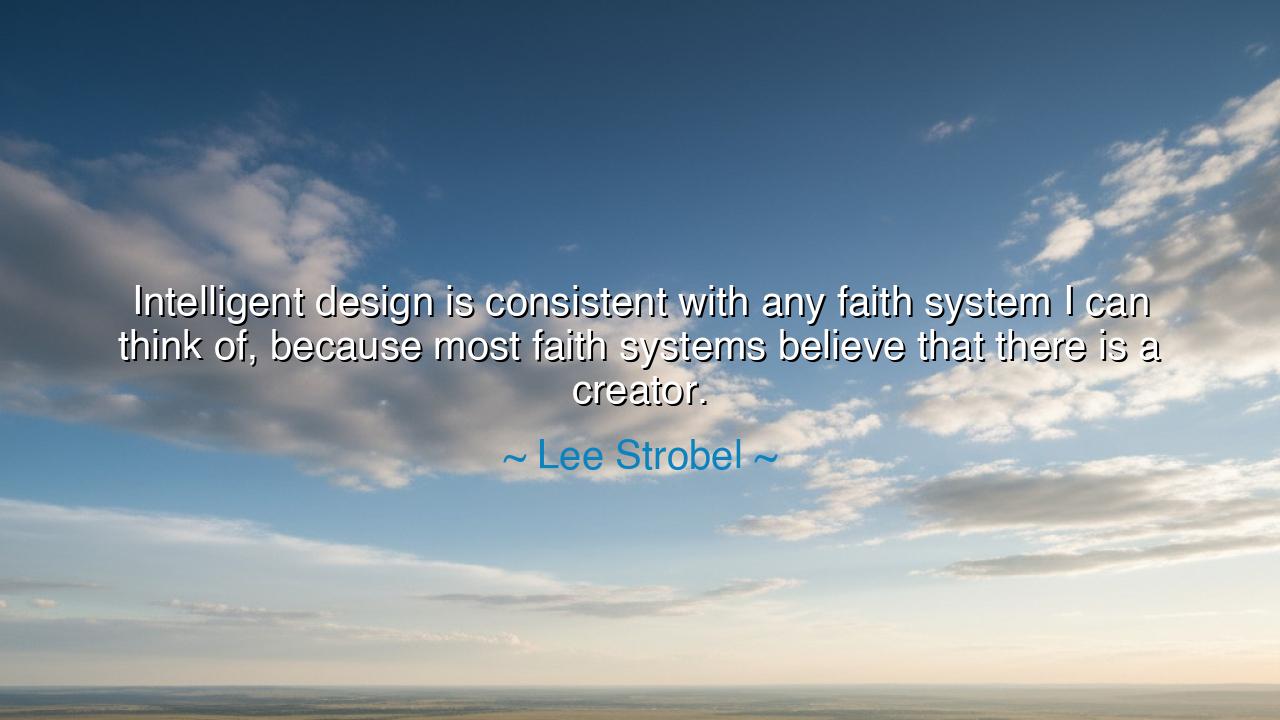
Intelligent design is consistent with any faith system I can
Intelligent design is consistent with any faith system I can think of, because most faith systems believe that there is a creator.






In the words of Lee Strobel, the seeker who journeyed from skepticism to faith, we find a bridge between the realms of belief and reason: “Intelligent design is consistent with any faith system I can think of, because most faith systems believe that there is a creator.” These words, simple in their phrasing yet profound in their reach, speak to the eternal longing of the human spirit—to understand its origin, to find meaning in the architecture of existence. In this declaration lies not the cry of division, but of unity: that beneath the many languages of faith, beneath the differing rituals and symbols, there lies a shared recognition—that creation bears the fingerprints of intelligence, that the universe was not born of chaos alone, but out of purpose and design.
To understand the origin of this quote, one must know the man. Lee Strobel was once a journalist devoted to the creed of evidence and logic, a skeptic whose pen defended reason against belief. Yet, when confronted with questions of existence, morality, and beauty, he embarked on an inquiry not unlike those of the ancient philosophers—a search for the source behind the order. His journey led him to a revelation that echoed through the ages: that reason, when followed honestly, does not destroy faith—it leads to it. For reason, when it beholds the intricacies of life and the vastness of the cosmos, must ask: who or what made this possible? Thus, in his words, intelligent design becomes not a dogma, but a meeting place between science and spirituality.
The ancients too pondered this mystery. When Aristotle gazed upon the heavens, he spoke of the “Unmoved Mover,” the prime cause that set all motion into being yet remained still itself. In faraway India, sages of the Vedas sang of Brahman, the infinite consciousness that breathed the world into life. In the lands of the Nile, the Egyptians saw the divine craftsman Ptah, shaping reality through the power of word and thought. Though they spoke in different tongues, their visions converged upon one truth: that creation is not an accident, but an act of mind and intention. What Strobel expresses in modern tongue is what the ancients whispered in sacred verse—that the intelligence behind the cosmos is the seed of all faith.
Yet Strobel’s words carry another layer of wisdom. He reminds us that faith systems, though many, are not meant to war against one another, but to reveal diverse reflections of a single truth. Whether one calls the source “God,” “the Creator,” “the Architect,” or “the Great Spirit,” the essence is shared: a reverence for the unseen order that sustains all things. The tragedy of humankind has too often been its forgetfulness of this shared awe. When belief turns to pride, and doctrine to division, the sacred harmony is lost. But intelligent design, as Strobel suggests, transcends such quarrels—it invites all seekers to look at creation and remember the mystery that unites them.
Consider the story of Johannes Kepler, the astronomer who charted the dance of the planets. Though a man of science, he spoke not with cold precision but with reverence: “I am thinking God’s thoughts after Him.” To Kepler, the laws of motion were not chains of necessity but the handwriting of a divine mathematician. He found no conflict between his equations and his faith—only a deeper wonder. This is the spirit Strobel calls us to reclaim: the recognition that reason and reverence are not enemies, but partners in the human quest for understanding. The one observes, the other contemplates; together they illuminate the face of the divine.
The lesson, then, is this: seek unity in truth, not division in doctrine. Whether your path winds through temples, cathedrals, mosques, or the quiet solitude of thought, remember that all paths seek the same horizon—the source from which life and intelligence spring. Do not fear the language of another’s belief, for it may be the echo of your own spoken long ago in another tongue. Let intelligent design be not a weapon of argument, but a reminder of wonder—that we live in a world woven with intention, where even the smallest atom bears the signature of a grand design.
And so, my child, as you walk among the wonders of this world—the song of the stars, the precision of the cell, the mystery of your own mind—pause and listen. Within these patterns beats the rhythm of purpose. Let curiosity be your prayer, and understanding your offering. For in the marriage of faith and intellect lies the harmony our ancestors sought—the harmony Strobel saw when he said that every faith, at its heart, recognizes the Creator behind creation. Seek not to prove, nor to conquer, but to behold—and you shall find the divine woven through all things.






AAdministratorAdministrator
Welcome, honored guests. Please leave a comment, we will respond soon